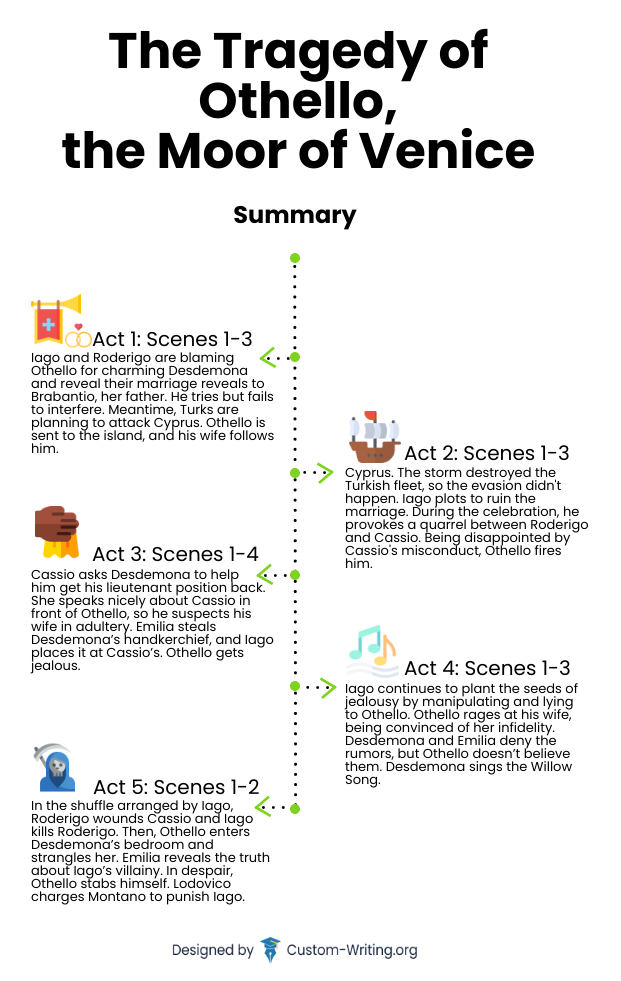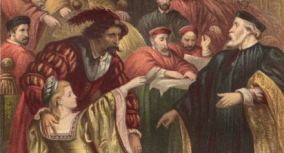The Othello summary on this page covers all the key episodes from Shakespeare’s play: the protagonist’s secret marriage, the attack on Cyprus, Iago’s manipulations, Othello’s growing jealousy, him murdering Desdemona, and his own tragic demise. While the plot of Othello is mostly famous for its exploration of jealousy, many other aspects of the play must be included in a summary: for example, Iago’s thirst for revenge and Emilia’s unknowing involvement in his plans.
Below, our custom-writing experts will discuss the play’s narrative, analyze its development, and present a full synopsis. In addition to a detailed breakdown of the story, you will also find here Othello‘s short summary and a plot map.
Othello Plot Map

Othello Synopsis
Othello, the Moor of Venice, is a tragic story about passionate love and disastrous jealousy. The action begins in 16th-century Venice. A noble black warrior Othello secretly marries a stunning Desdemona, daughter of a well-known senator Brabantio. This marriage makes two of Othello’s enemies, Iago and Roderigo, furious. The former is angry for multiple reasons. He is jealous of this successful career and private life. Also, Othello appointed young Cassio as the chief lieutenant instead of Iago. Meanwhile, Roderigo is jealous due to his unrequited love for Desdemona.
Othello’s plot mainly focuses on the harsh conflict between Iago and Othello. Desiring to revenge the general, Iago and Roderigo cooperate and create a plan. They decide to accuse the innocent Desdemona of her romantic relationship with Cassio. Insidious Iago makes his wife, Emilia, steal Desdemona’s handkerchief. Then, this romantic gift from Othello appears at Cassio. Hearing rumors spread by Roderigo and Iago, Othello stars doubting Desdemona’s faithfulness. The cloth becomes the final evidence. The black warrior is sure – his wife cheats on him with his chief lieutenant.
Being incredibly furious, Othello is seeking vengeance. He strangles Desdemona in her bed. Then, Emilia reveals the truth. She talks about Iago’s evil plan and convinces Othello of his wife’s innocence. Realizing his fatal mistake, the black general kills himself. On this tragic note, the play ends.
Othello Summary
Here you’ll see the short summary that offers essential information about the play. To investigate it and understand what Othello is about, take a look at our analysis.
Act 1
Act 1 of the play begins with an intense dialogue between Roderigo and Iago. The two men are mad at Othello, a noble black general of the Venetian army. Roderigo’s pride is hurt when he learns that Desdemona has recently become Othello’s wife. She, the daughter of the prominent senator Brabantio, rejected his advances but fell for Othello. Thus, he is willing to ruin the marriage by all means possible.
The second Othello’s enemy is Iago. He was one of the candidates to take the title of chief lieutenant. Despite Iago’s hopes, Othello appoints Cassio in this position. Iago considers this choice to be unfair. He believes that Cassio is not old and experienced enough to be a chief lieutenant. So, willing to revenge Othello, Iago only pretends to serve him. Together with Roderigo, they develop an evil plan that plays a detrimental role in Othello’s story.
The first villainy from Roderigo and Iago is their performance in Brabantio’s yard. Desdemona married Othello secretly, and the two men decide to reveal the truth to her father. They come to his house and start blaming Desdemona for having a relationship with Othello.
Furious Brabantio wants to figure out everything. He comes to his daughter’s new husband and blames him for seducing an innocent Desdemona. However, Othello proves that this relationship bases on trust and sincere feelings. The noble warrior told her exciting stories about his heroic feats. Listening to them, Desdemona fell in love with Othello. Begrudgingly, Brabantio believes that his daughter truly loves her new husband.
After that, Othello’s plot suddenly turns in the other direction. Turks are planning to invade Cyprus. So, Othello is sent to Cyprus to defend the island from the Turkish invasion. Being a responsible warrior, Othello is willing to go on the war. Loyal Desdemona decides to go with her husband to Cyprus and support him in the difficult times of war. This honorable action gives Iago another idea for revenge on Othello.
Act 2
Meanwhile, the Turkish invasion was over even before it began. The massive storm at sea destroyed all the Turkish ships. Only the Venetian army sailed to Cyprus. Being happy about the easy win, Othello celebrates this event in the evening. So, he invites everyone to the castle.
Left alone, Iago and Roderigo continue discussing their plan. Iago suggests that young and beautiful Desdemona will soon get tired of Othello. The next potential candidate to become Desdemona’s husband is brave Cassio. Thus, Iago and Roderigo plan to make Othello think that his wife cheats on him with Cassio.
Iago suggests Roderigo get into a fight with Cassio at the evening event. It would make Cassio less noble and responsible in Othello’s eyes. After Roderigo agrees and leaves, the most celebrated soliloquy of Act 2 takes part. Iago secretly lusts after Desdemona. He suspects that Othello had an intimate connection with his wife, Emilia. His inability to seduce Desdemona led to him developing another plan for revenge. He hopes that the rumors about the affair between Desdemona and Cassio will hit Othello hard.
The next scene begins with Othello leaving Cassio as a guard near the castle. The command is to practice self-resistance during the celebration as Cassio has a drinking problem. Othello leaves, and Iago comes trying to engage the chief lieutenant into a conversation. They discuss Desdemona’s nature with Iago trying to convince Cassio that she is a temptress. Yet he disagrees, claiming that Desdemona is shy and modest.
Iago decides to persuade Cassio to drink alcoholic beverages. Despite Cassio’s excuses, he finally agrees. Then, Roderigo and three other Cypriots join the feast. Roderigo waits until Cassio becomes very drunk and provokes a quarrel. Montano, the governor of Cyprus, attempts to stop the fight. However, under the influence of alcohol, Cassio injures Montano and Roderigo. This incident causes a lot of noise, attracting Othello. He is shocked by Cassio’s misconduct and, being extremely angry, fires him.
Act 3
Cassio is concerned about his reputation. Iago, taking this occasion, continues implementing his envy plan. He suggests seeking help from Desdemona. Being a kind-hearted woman, she would ask her husband to return Cassio to his position. Iago sees it as his chance to provoke interaction between Desdemona and Cassio. It can encourage Othello’s thinking that his wife betrays him.
In Act 3, Desdemona asks Othello to forgive Cassio. Such behavior makes Othello think she has a specific connection with Cassio. He even urges Emilia to watch Desdemona, eavesdrop, and report to Othello.
The suspicions increase due to constant Iago’s pressure. He attempts to blame Desdemona for her unfaithfulness in all the possible ways. For example, Iago takes Othello to eavesdrop on Cassio’s story about Bianca, his lover. Othello starts listening from the middle of the conversation, so he does not hear the woman’s name. Surrounded by rumors, Othello is sure that Cassio talks about his intimacy with Desdemona.
The “evidence” that plays a detrimental role in Desdemona’s fate is the handkerchief. Othello presented it to his wife at their wedding as a love token. One evening, Desdemona drops her handkerchief on the floor. Emilia picks it up and gives it to Iago. He asked his wife to bring him Desdemona’s handkerchief several times.
Act 4
Iago continues his evil plan. He secretly puts Desdemona’s handkerchief in Cassio’s room. Thus, he makes Othello’s jealousy even more reasonable. Noticing his present for Desdemona at Cassio, Othello rages at him. Trying to figure out the truth, the general asks his wife, but Desdemona has no clue where the cloth is. Furious Othello desires revenge, while his wife sings The Willow Song in despair.
Act 5
Act 5 is the most tragic part of the entire play. The warrior plans his vengeance on his wife. Meanwhile, Cassio, Iago, and Roderigo get into an encounter. As a result, Cassio is seriously injured, and Roderigo is killed by Iago.
Fixing up a chance, Othello enters the bedroom. He finds Desdemona lying in her bed and decides that the time of revenge has finally come. Othello mercilessly strangles his beloved one with a pillow despite all Desdemona’s excuses.
Horrified, Emilia rushes into the room. She discovers Desdemona’s dead body and reveals the truth to Othello. She blames her husband for being a sneaky and manipulative man who spread baseless lies. As a result, enraged Iago murders Emilia.
Confused, Othello realizes that he killed his innocent wife and feels completely lost in his thoughts. Under pressure, he kills himself; thus, the dramatic Othello’s story ends.
Cassio becomes the governor of Cyprus. Now, he has a mission: to carry out a harsh trial over the villain, Iago.
Othello Analysis
Othello, the Moor of Venice, is an iconic piece of art. Written by Shakespeare in 1603, it still contains uncovered secrets. That is what attracts readers’ attention the most.
The play begins with the exaltation of Othello as a noble warrior. It is his bravery and military achievements that made Desdemona fall for Othello. Besides, Shakespeare introduces unusual settings as the action takes place in the Mediterranean Sea. Such a spacious yet dangerous location highlights Othello’s heroism and noble nature.
However, after Act 1, the tone of the play shifts. Starting from Act 2, Othello is always predisposed to rumors about his wife’s adultery. As a result, terrible jealousy starts eating Othello up from the inside. From a noble general, he turns into an envious scoundrel. Even the settings highlight the tone shift. From the spacious sea in Act 1, readers move into a tiny room where Othello kills Desdemona in Act 5. Therefore, Shakespeare delivers the message: jealousy is a destructive force. It does not let the person think clearly and act reasonably.
The play contains several conflicts:
- the destructive nature of jealousy;
- the obsession with revenge;
- the incompatibility of love and military heroism.
The issues of jealousy and revenge are closely connected in Othello. In desperate attempts to avenge, Iago and Roderigo decide to make Othello doubt his wife. Hence, Shakespeare illustrates jealousy as a tool for vengeance.
The desire to get back at Othello increases throughout the play. Othello’s jealousy progresses as well, harming him repeatedly and making him beast-like. Finally, the general’s emotions reach their peak. He mercilessly kills his innocent wife without figuring out the truth.
As a result, the play ends with numerous victims. Innocent Desdemona is strangled because of her husband’s jealousy. Othello becomes a victim of his blindness. Iago murders Emilia for her attempts to establish justice, revealing the truth. Roderigo becomes a victim of Iago’s greed. Cassio is involved in the conflict against his will. Finally, Iago suffers from his villainy when his manipulations are revealed. Thus, jealousy and revenge play a detrimental role in Othello.
Another conflict is the incompatibility of love and military heroism. Othello amazes Desdemona with his heroic achievements and bravery. Later his career only gets in the lovers’ way. The central character is incapable of balancing his professional and private life. First and foremost, he is a warrior. The respect from his colleagues becomes a more significant part of Othello’s life, then – his wife’s feelings.
In Othello, Shakespeare implements his innovative ideas. It is the first play where the conflict between the protagonist and antagonist is not apparent. Till the very end, Othello is confident about Iago’s faithfulness. So, the main character does not even suspect Iago to be a betrayer. Moreover, the antagonist plays a more significant role in the development of the storyline. Although Othello is the main character, the central intrigue of the play is happening around Iago.
Thanks for reading the article! For more information about the play, check other pages. To write an incredible essay on Othello, consider our topics and samples.











